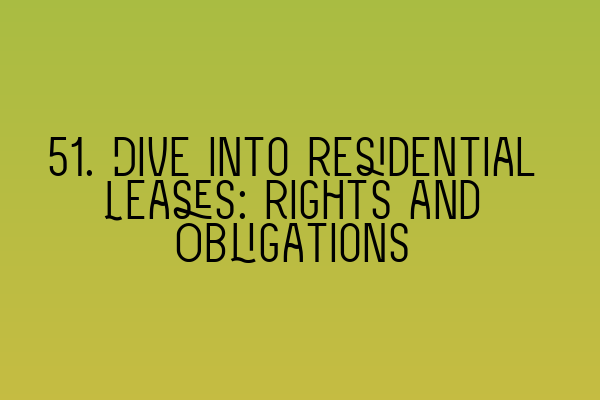51. Dive into Residential Leases: Rights and Obligations
Welcome to the official blog of SQE Property Law & Land Law. In this edition, we will be diving into the intricacies of residential leases and exploring the rights and obligations of both landlords and tenants. Whether you are a landlord seeking to understand your responsibilities or a tenant looking to assert your rights, this article will provide you with the information you need.
Understanding Residential Leases
A residential lease is a legally binding contract between a landlord and a tenant that outlines the terms and conditions under which a property is rented. It establishes the rights and obligations of both parties and ensures clarity and protection for both the landlord and the tenant.
Residential leases can vary in length, with short-term leases typically lasting a few months to long-term leases that can span several years. The specific details of a residential lease can vary from one agreement to another, but certain rights and obligations remain consistent across most leases.
Rights of the Landlord
As a landlord, it is essential to understand your rights in order to effectively manage your property and protect your interests. Some key rights include:
- The right to collect rent: The landlord has the right to expect timely payment of rent as stipulated in the lease agreement.
- The right to maintain the property: The landlord is responsible for ensuring that the property is maintained in a safe and habitable condition.
- The right to enter the property: The landlord has the right to enter the property for specific purposes, such as conducting repairs or inspecting the premises.
- The right to enforce lease terms: The landlord can enforce the terms of the lease, including provisions related to property use, pet policies, and noise restrictions.
To learn more about the rights of landlords, click here.
Obligations of the Landlord
Alongside their rights, landlords also have certain obligations that they must fulfill. Some common obligations include:
- The obligation to provide a habitable property: It is the duty of the landlord to ensure that the property is safe, clean, and meets all health and safety requirements.
- The obligation to maintain and repair the property: Landlords are responsible for addressing any maintenance and repair issues that arise during the tenancy.
- The obligation to respect the tenant’s privacy: Landlords must give tenants reasonable notice and obtain their consent before entering the property, except in cases of emergency.
To learn more about the obligations of landlords, click here.
Rights of the Tenant
Tenants also have rights that are protected under the law. Understanding these rights can empower tenants to assert their interests confidently. Some key rights include:
- The right to live in a habitable property: Tenants are entitled to reside in a property that meets minimum standards of habitability.
- The right to a safe and secure environment: Tenants have the right to live in a property that is free from hazards and provides adequate security measures.
- The right to challenge unfair rent increases: In certain jurisdictions, tenants have the right to contest unreasonable rent increases.
To learn more about the rights of tenants, click here.
Obligations of the Tenant
While tenants have rights, they also have obligations that they must fulfill as part of their lease agreement. These obligations typically include:
- The obligation to pay rent: Tenants are required to pay rent in a timely manner as specified in the lease agreement.
- The obligation to maintain the property: Tenants are responsible for keeping the property reasonably clean and reporting any maintenance issues to the landlord promptly.
- The obligation to adhere to lease terms: Tenants must comply with the terms of the lease agreement, including any restrictions on property use, pet policies, and noise regulations.
To learn more about the obligations of tenants, click here.
Residential leases play a vital role in shaping the relationship between landlords and tenants. By understanding their rights and obligations, both parties can ensure a harmonious and mutually beneficial tenancy. If you require legal advice or assistance regarding residential leases, feel free to contact us to speak with one of our experienced solicitors.
Stay tuned for more informative articles on property law and land law from SQE Property Law & Land Law!
